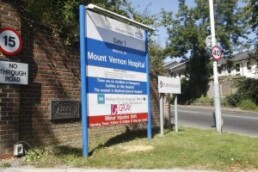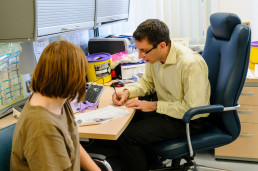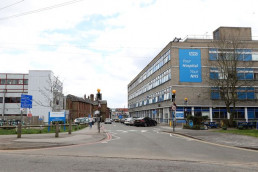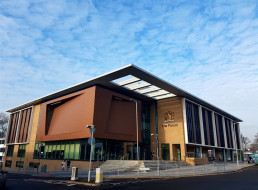WATFORD GENERAL PLANS DELAY PROGRESS FOR CANCER CENTRE
Vital work to provide a new building for the Mount Vernon Cancer Centre MVCC) is being held up by wrangling among NHS bureaucrats.
The delay - which could mean cancer patients waiting ten years for much-needed new premises - is being caused by the determination of West Herts Trust to press ahead with rebuilding Watford General.
New analysis by Dacorum Health Action Group explains that:
- Cancer centres, where patients are treated with chemotherapy and radiotherapy, need to be located next to acute hospitals where facilities like intensive care units are available
- The MVCC buildings at Northwood, Middlesex, are in very poor condition and are far from the necessary acute services, making care difficult for patients and staff
- Watford General has been put forward by the NHS as the site for a new MVCC
- But the NHS is giving priority to the 7-year rebuild of Watford General, with the MVCC move taking second place
- Dacorum Health Action Group (DHAG) is calling on the NHS to explore clear new accessible sites where a new MVCC could be located alongside a new West Hertfordshire A&E hospital
DHAG's new analysis of the MVCC situation is below:
HEMEL'S NEW MP FACES DAUNTING HEALTH IN-TRAY
Congratulations to David Taylor MP.
Hemel Hempstead elected a new MP yesterday as part of the Labour landslide that sees Keir Starmer take over in Downing Street.
David Taylor will have to tackle a wide variety of health and hospital issues. His last leaflet before the election was all about health, so he realises how important it is.
Here are just some of the issues he faces:
- Hemel people don't want Watford General. David must now be aware, from the doorstep and from reports of our public meeting, that people in Hemel don't want Watford General to be rebuilt in a hugely disruptive and unaffordable 7-year project. Will he follow the cross-party tradition of Hemel MPs opposing the Watford rebuild? His majority is under 5000, making it a marginal. He will surely have to take into account the views of his constituents. But in Watford, David's colleague Matt Turmaine has promised people that Watford General will be rebuilt. How will Labour square this circle?
- Financial woes at the West Herts Trust. The West Herts Trust is facing an £18.5m deficit this year - the poorest financial performance in the Herts and West Essex region. Cuts of £27m are being applied - how will David be monitoring the impact of the cuts on patient services? There may be no money for David's idea of a Community Hospital for Hemel.
- Mount Vernon crisis. Vital new premises for the crumbling Mount Vernon Cancer Centre are seemingly being held up by disgraceful NHS dithering. The problem is that a crucial move for MVCC cannot happen until the Watford General rebuild is finished - meaning a ten-year wait for a new MVCC. The obvious solution - a clear joint site for a new West Herts Hospital and a new MVCC - is apparently ruled out by West Herts' obsession with building at Watford. This is a story that reflects very badly on the NHS.
- Trust Board does not reflect Dacorum views. Key decisions on hospitals for the 155000 people of Dacorum are made by the unelected Board of the West Herts Trust, which has NOT ONE independent member from the Borough. David has expressed his concern in the past and should now demand urgent action to correct a situation which is totally unacceptable. How was this ever allowed to happen?
- GP and dental access problems. GP access is hard for everybody now, but some Hemel practices are worse than others. How can the worst learn from the best? Dental deserts are rife all over the country - how can the NHS tackle that problem in Hemel and other parts of West Herts?
WATFORD GENERAL PLANS GET THUMBS DOWN AT HEMEL ELECTION MEETING
A pre-election meeting of more than 150 people in Hemel Hempstead earlier this week saw overwhelming rejection of the plans to rebuild Watford General Hospital.
Many people called on the NHS to look at options for a clear new site with better access than the cramped and crumbling Vicarage Road facility.
Four general election candidates taking part in the meeting, organised by Dacorum Health Action Group at Hemel Methodist Church, also expressed concern about the £1.4bn, 7-year Watford project.
The Labour Party did not provide a representative.
There was widespread support from candidates and the audience for much better hospital services in Hemel Hempstead.
Public feedback after the meeting showed the depth of feeling about our hospitals and the undemocratic way the West Herts Hospitals Trust decides on investment.
Photo credit: Gary Norman
HEALTH ACTION GROUP CALLS FOR ACTION TO TACKLE DACORUM GP FAILINGS
A call for urgent NHS action to correct serious failings in Dacorum's GP services has come from Dacorum Health Action Group (DHAG).
DHAG Chair Philip Aylett has written to the senior leader of the NHS in the area setting out a plethora of primary care problems reported to DHAG on the social media portal nextdoor. These include:
• Difficulty in making appointments
• Questions about the effectiveness of telephone appointments
• The weakening of the role of the GP as an enabler of access to NHS services and an advocate for the patient
• Doubts about the value of the wider range of health professionals now employed by practices
Dr Aylett has invited Paul Burstow, Chair of the Integrated Care Board (ICB) for Herts and West Essex to meet people who are unhappy with the service they get from their GP. He has also asked the ICB to review the workings of Primary Care Networks, groups of GP practices which were supposed to help improve the service. PCNs seem to have made little impact on raising standards.
Attached to Dr Aylett's letter is a selection of the evidence about GP problems gathered by DHAG.
The letter is here: Letter to P Burstow FINAL
GP PROBLEMS IN DACORUM - PATIENTS TELL THEIR STORIES
Patients in Dacorum have been sharing their stories of problems accessing and using primary care services.
Dacorum Health Action Group asked users of the nextdoor social network for their views of GPs and other primary care services in the area. The results were very concerning.
Among the main difficulties encountered by Dacorum people are:
- It often takes weeks to get appointments, even for urgent and serious conditions
- Booking systems are very difficult to navigate
- Phone appointments sometimes don't allow proper diagnosis
- Online consultation platforms can't replace face-to-face consultations with a real doctor
- There are doubts about the effectiveness of the increasing numbers of practice staff who are not qualified doctors
The acute hospitals seem content to say to people who turn up at urgent care 'make an appointment with your GP'. They don't always realise how hard that can be.
We will be contacting the regional NHS supervisory body, the Integrated Care Board, asking what they can do to make the situation more bearable. It is clear that some practices are much better than others - they need to be able to spread their good practice to the ones in the slow lane.
A selection of the comments made on nextdoor is below:
WATFORD GENERAL MATERNITY - TRUST DIRECTOR SPEAKS OUT
West Herts Trust non-executive director Jonathan Rennison has publicly criticised the culture of Watford General's maternity unit. Speaking in a Trust Board meeting on Thursday, Jonathan also talked about the responsibility of senior management and the Board. Referring to the maternity unit, he said:
“There are a small number of people, but they are very vocal and they are in some senior positions and they drive some poor behaviours as well as a narrative that undermines [inaudible] culture and I think we just really need to be clear that that isn’t acceptable behaviour. There are professional standards for how you work with others, how you have professional respect, how you treat others and we have to be clear about that and start driving that change more ….
“It’s about how we start to empower staff to feel comfortable with that and that they know that we will have their back and that there won’t be any retribution for calling out bad behaviour because that’s where it falls down, it’s the bystander effect. People are afraid to step in and call it out because they see what has happened to others. So we have to be more vocal and we have to be setting that tone and that message around this (Trust Board) table as well, and saying it’s not acceptable because otherwise that change never happens. It has to be set from the top.
“So great work has been done and I have to say Mitra [Bakhtiari, Director of Midwifery and Gynaecology, who is leaving the Trust] has been an exemplar in terms of her behaviour and she does call it out and gets an awful lot of unpleasant backlash that we are not necessarily aware of around this table and it’s about saying that is not acceptable. Just to say thank you to Mitra again for the work she has done ...When she goes we need others to be stepping up and to be doing what Mitra has been doing so we don’t have that gap.”
A senior clinician responded by pointing to ongoing work to get the culture of Maternity better, including a number of recent events aimed at improving working relationships, notably a senior midwifery awayday and a consultant awayday. There are more programmes planned. In terms of improving the culture, he said, “We are on the right path”.
CAMPAIGNERS CALL ON POLITICIANS TO ACT ON DACORUM'S HEALTH PROBLEMS
Today the Dacorum Health Action Group (DHAG) calls on all elected local representatives to challenge the NHS to improve provision for the Borough's population.
In its first Newsletter, DHAG points to a number of issues where NHS bodies are failing to provide good service - or to plan adequately for the future.
We at DHAG believe that elected local and national representatives need to challenge unelected and unaccountable NHS bodies, such as the West Hertfordshire Teaching Hospitals Trust, to do much better for Hertfordshire's most populous Borough.
Headlines from the Newsletter include:
- The future health needs of the growing and ageing Dacorum population need to be independently assessed before any decision is taken on the location of NHS services in the Borough;
- The costly, flawed plans for redeveloping Watford Hospital are seriously threatened by the poor financial situation at the West Hertfordshire Trust. Better and cheaper alternatives on clear new sites must be explored urgently.
The link to the Newsletter is Newsletter 1
CARE GAP BETWEEN WATFORD AND DACORUM SET TO GROW AS EMERGENCY DEMAND SOARS
Demand for urgent and emergency care is likely to soar as the population ages, new NHS figures reveal.
Older people need NHS care much more than younger people, with people in their 70s for example having more 'consultant episodes' than any other age group.
But, in Dacorum's case, the NHS is planning to meet the demand for emergency and urgent care by forcing many more people to make the journey to Watford General - and will fail to provide adequately for care in Hemel Hempstead.
Dacorum Council will need to be wary of the NHS plans to sharply increase the Borough's care gap with Watford when considering the next step on a possible Health Campus or Hub for Hemel.
Stunning figures produced by the umbrella NHS body for Herts and West Essex, the ICB, project huge rises in numbers in the whole area's elderly age groups between 2018 and 2043:
- A rise of well over 70% in the number of over-85s, and
- A rise of over 40% in the number of over-65s
This ICB graph sums that up, with the top purple line showing projected numbers of over-85s and the yellow line showing over-65s.
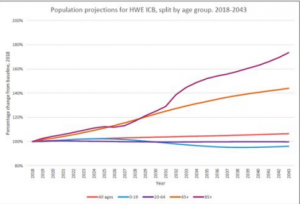
And what is the West Herts Trust going to do to meet the rapid rise in demand? In the years between 2019 and 2036, they plan to provide for:
- A rise of 30% in emergency department activity at Watford General, from just over 107,000 to nearly 140,000 cases a year
- A rise of just over 6% in cases at Hemel urgent treatment centre, from about 40,000 to 42,600 a year, well below what is needed in light of Dacorum's ageing and growing population
The whole point of urgent treatment centres is to divert patients away from accident and emergency departments if they are not in a very serious condition. The Trust seem happy to ignore that sensible policy, in order to ensure that Watford General gets the bulk of development, whatever the demand from the Borough of Dacorum.
There will also be a 20,000 rise in routine appointments at Watford General, against a 7,000 rise in Hemel Hempstead.
THE PLANS UNDERLINE ONCE MORE THE BLATANT BIAS OF THE 'LOCAL' NHS TRUST IN FAVOUR OF WATFORD GENERAL AND AGAINST ADEQUATE DEVELOPMENT FOR DACORUM.
UNLESS THEY ARE STOPPED, THE NHS WILL MAKE DACORUM PEOPLE MORE RELIANT ON THE INACCESSIBLE AND SHAMBOLIC WATFORD GENERAL.
URGENT CARE LONG WAITS SHOW HEMEL HEALTH PLANS ARE INADEQUATE
A local health group today attacked plans for a new health building for Hemel Hempstead to replace the town's existing Hospital as 'inadequate' and showing 'a disappointing lack of ambition'.
New statistics reveal that patients have to wait an average of nearly two-and-a-half hours to be seen at the current Hemel Hospital's urgent treatment centre (UTC). That is above the national target for wait times in such centres, and half an hour longer than the national average. The pressure on the UTC is unrelenting for long periods.
The Dacorum Health Action Group (DHAG) warned against plans which would see demolition of the current Hospital without an adequate replacement. Dacorum Council and the NHS are working on proposals to move services from the Hemel Hospital to a new purpose-built Health Campus on the constrained Market Square site in Marlowes, Hemel's main street. Current plans are for a small urgent treatment centre in the new building, which would apparently just mirror the current Hemel UTC, with little capacity to expand to serve the Borough's growing and ageing population.
Philip Aylett, Chair of DHAG, criticised the plans for failing to take account of changes in demand for health services:
'The current plans for a new Health Campus completely fail to reflect the future needs of Dacorum. It would be very unwise to demolish the current Hospital and replace it with cramped facilities that would soon be overwhelmed by our growing and ageing population. The last thing we want is a glorified GP surgery.'
Dr Aylett said the current planning process was exactly the wrong way around:
'The need for regeneration in Hemel is obvious, and new buildings can certainly help to revive the town. But in rushing to redevelop, the plans put the cart before the horse. The priority should be first to assess future health needs for our growing Borough, then to decide on the best location. Instead, the Council seems prepared to accept the inadequate offer made by the West Herts Hospitals Trust, which has always favoured Watford General and apparently sees Hemel Hospital as something of an embarrassment.
'At the moment the Council is showing a disappointing lack of ambition for our health services. Hemel Hospital has some sound buildings despite years of neglect by the Trust. The UTC is too small and busy and needs to be expanded. We also need many more routine medical appointments at Hemel, so fewer Dacorum people have to make the journey to the building site that is Watford General.
'The Council should stand up to the NHS and demand the services the Borough needs for the future'
WATFORD GENERAL SLIPS IN A AND E TABLE
Watford General's Accident and Emergency rating worsened slightly last month as the key four-hour wait stats deteriorated - and ambulance turnround times lengthened.
But Lister Hospital in Stevenage did even worse on A and E as both Hertfordshire acute hospitals struggled to meet their targets.
At Watford General, only 43.8% of the most urgent (Type One) cases were admitted, transferred or discharged within four hours in November. The official target is to achieve a 95% figure. The average last month in England was 55.4%, so Watford is well below average.
That means that West Herts A and E comes about 109th out of 122 in England on that four-hour measure, a bit lower than last month. But the Lister did even worse, with just 41.1% of the Type One cases within the four hours. And below the Hertfordshire strugglers come a number of desperate cases, with Hillingdon dealing with just 29.6% of Type Ones within four hours.
Ambulance handover times at Watford also got worse in November, with 86.4% of handovers taking over 15 minutes, against 79% in October.
Overall, not a good picture - with three local trusts at or near the bottom of the four-hour table on a regular basis.
Yet Homerton Hospital in Hackney, dealing with some of the poorest areas in the country, manages to deal with 81.7% of Type One cases within four hours. What is wrong with our little group of trusts that they fail to match a hospital which is facing so many challenges? Maybe our managers should visit Homerton - they might learn a thing or two.

